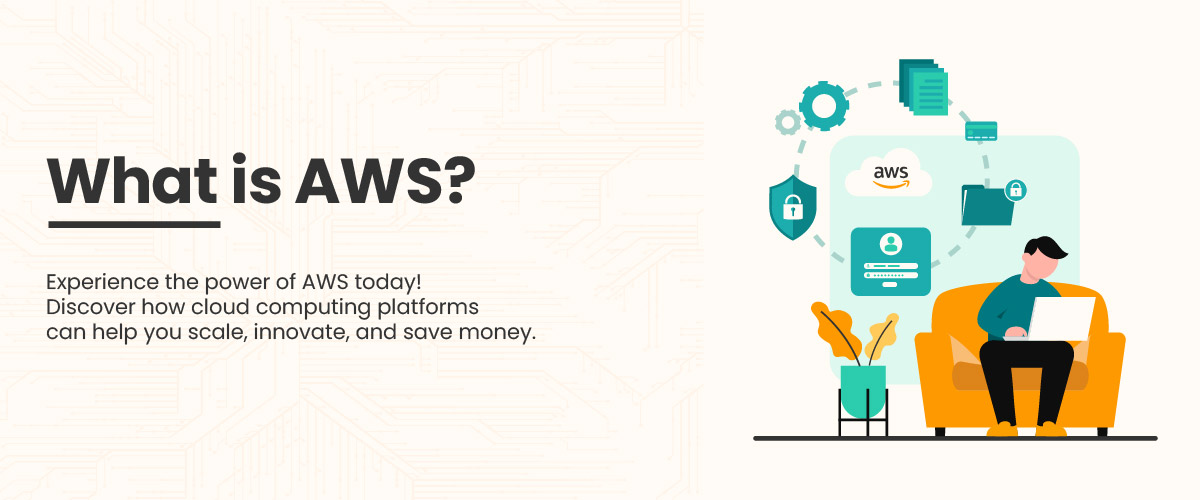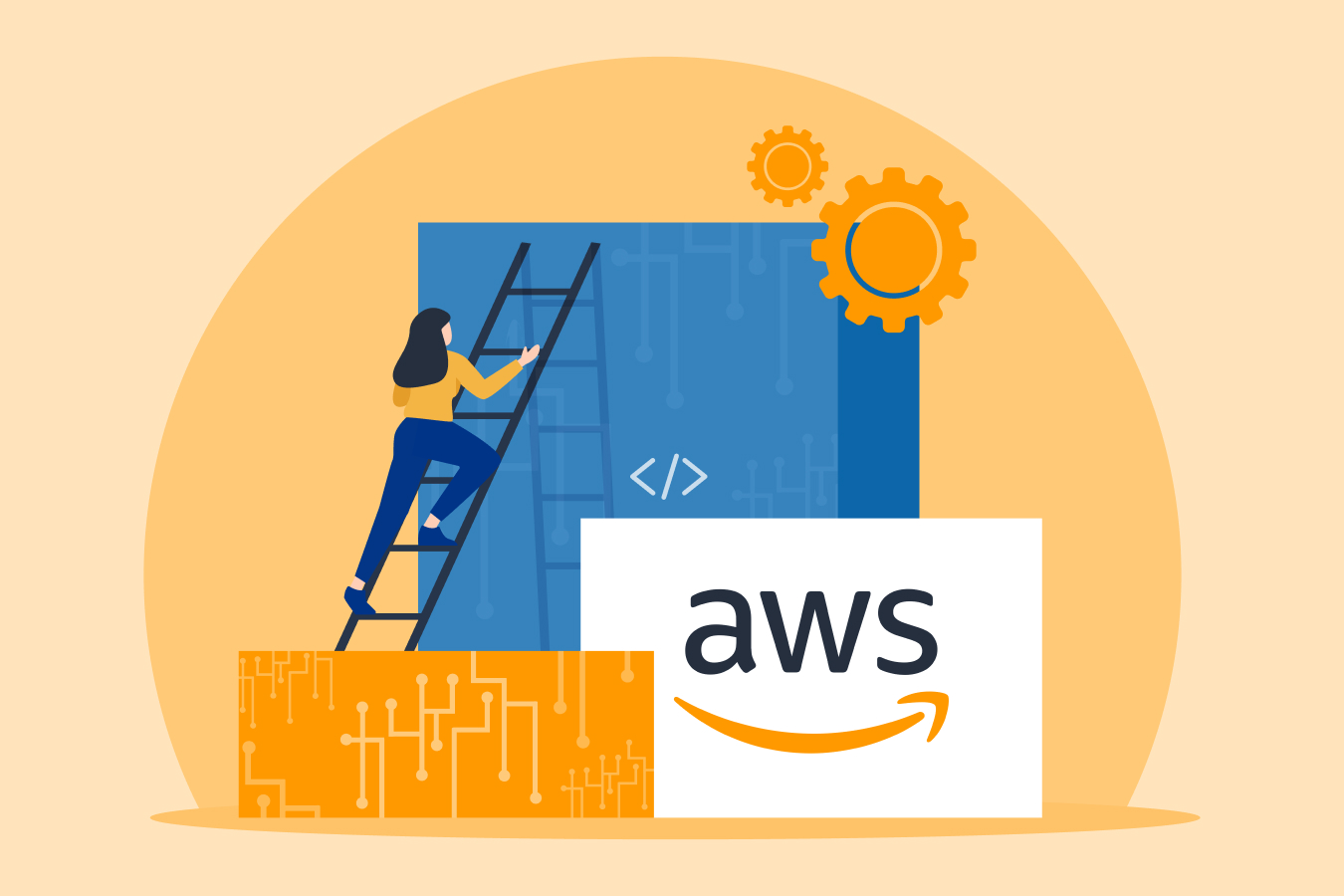What is AWS?
AWS is a leading cloud computing provider in the world, with a market share of over 30%, and offers over 175 services for networking, storage, computing, etc.
If you’re looking to unlock the potential of cloud computing, Amazon’s AWS platform is a great place to start. With a comprehensive suite of services, AWS can help you build, deploy, manage, and scale applications quickly and easily.
An Overview of AWS
Amazon Web Services (AWS) is a cloud computing platform provided by Amazon, which offers highly scalable, fault-tolerant, and cost-effective cloud-based computing services. It is a cloud computing platform, offering customers to outsource their computing, network, storage, and database requirements instead of investing in their infrastructure.
The platform provides a wide range of services enabling businesses to build and run virtually any application, from simple websites to complex enterprise applications.
AWS operates on a pay-as-you-go model, where businesses only pay for the services they use and can scale their usage up or down as per requirement. This makes it an ideal choice for businesses that need to rapidly scale their infrastructure to accommodate sudden spikes in demand or unexpected growth.
AWS (Amazon Web Services) is a cloud-based computing, storage, and networking service which makes it easier to scale capacity so businesses of all sizes can run their applications and store their data. AWS also increases reliability and agility as organizations can access virtually unlimited computing power on demand. Organizations today also look for professionals who can manage these AWS resources, a career in this field is quite lucrative.
Understanding the Basics of Cloud Computing
Before embarking on the cloud computing journey, it is essential to understand the basics of the technology like, cloud computing, why it has become the preferred solution for organizations of all sizes, and how it works.
- Cloud computing is a technology that enables on-demand access to computing resources, such as servers, storage, databases, and software without the need for direct server management.
- Cloud computing replaces hardware with secured, remote servers hosted in a data center, allowing users to access their data and services from anywhere, at any time, without worrying about storage and processing power limitations.
- Web services also allow for scalability, allowing users to access more storage and processing power as their needs grow without making significant hardware investments. Cloud computing reduces the need for additional hardware, infrastructure, and personnel to manage these services.
With a few simple steps, an organization can quickly scale up or down its resources as needed without any interruption or downtime. This makes AWS one of the most effective and efficient ways to utilize web services for any organization.
Functions of AWS
There are several benefits of using AWS, and AWS offers various services to its users. Some of the most opted functions are as follows –
- Analytics – There are several analytical services offered by AWS, such as Amazon Redshift for data warehousing, Amazon Athena for SQL-based data queries in S3, and Amazon EMR for Apache Hadoop and Spark execution on AWS.
- Application – AWS provides a variety of application services, such as AWS CodeDeploy and AWS Elastic Beanstalk, as well as messaging and queueing services like Amazon SQS and Amazon SNS.
- Database – AWS provides a variety of database services, including Amazon Redshift for data warehousing, Amazon DynamoDB for NoSQL databases, and Amazon RDS (Relational Database Service) provides scalable database services for MySQL, PostgreSQL, Oracle, and Microsoft SQL Server.
- Security – At the protocol and port access levels, they offer security. Security policies in Amazon filter traffic entering and leaving an EC2 instance. Amazon GuardDuty for threat detection, and AWS Certificate Manager for SSL/TLS certificate management.
Benefits of Using AWS
With Amazon AWS, businesses can take advantage of a wide range of services and features like serverless computing, high availability, elastic IPs, and load balancing, enabling them to implement cost-effective solutions that provide optimal performance.
Some of the key benefits of using AWS are –
- Scalability – AWS is designed to be highly scalable, which means businesses can quickly and easily scale their infrastructure up or down to meet their changing business needs. This enables businesses to rapidly respond to changing market conditions, customer demand, or unexpected growth.
- Flexibility – AWS provides a range of services, from computing power to storage and databases, among others, that allow businesses to build and deploy applications and services quickly and easily. AWS also provides support for a range of programming languages, platforms, and tools, giving businesses greater flexibility in developing and deploying their applications.
- Cost-Effective – AWS operates on a pay-as-you-go model, which means businesses only pay for the services they use. This makes it an attractive choice for businesses that want to reduce their IT costs and avoid the upfront capital expenditures associated with traditional on-premise infrastructure.
- Security – AWS provides a range of security features and tools that help businesses protect their data and applications. AWS has achieved various compliance certifications, including ISO 27001, HIPAA, and PCI DSS, among others, which demonstrates its commitment to security and data privacy.
- Global Reach – AWS has a global presence, with data centers in various regions worldwide. Enabling businesses to deploy their applications and services closer to their customers, reducing latency and improving performance.
Services offered by AWS
Before you can get the services offered by AWS, you need to set up an AWS account first. It’s important to take the time to properly understand how it works and plan out your usage before jumping in. It is possible to mix and match different services as per applications. Knowing the various services available and their use cases are essential for setting up an effective AWS environment.
Once you understand and set up your account, you’ll get an AWS IAM which stands for Identity and Access Management. Identity and Access Management (IAM) is a service in AWS that ensures the right person has access to the right thing. AWS IAM provides access control across all AWS services and resources. You can specify who can access which services and resources, and under what conditions.
After this, you can access the various services offered by AWS. Some of them are listed below –
- Amazon Elastic Compute Cloud (EC2): This service provides scalable computing capacity in the cloud, allowing businesses to spin up new instances to handle increased demand.
- Amazon Simple Storage Service (S3): This service provides scalable object storage for data backup, archive, and analytics.
- Amazon Simple Queue Service (SQS): This service provides a fully managed message queuing service for reliably sending and receiving messages between distributed systems.
- Amazon CloudFront: This service provides a content delivery network (CDN) for delivering content to users quickly and securely.
- Amazon Elastic MapReduce (EMR): This service provides a fully managed big data platform that allows businesses to process vast amounts of data using popular frameworks like Apache Hadoop and Apache Spark.
In addition to these core services, AWS offers a wide range of additional services, including security and compliance tools, messaging and queuing services, mobile and IoT services, developer tools, and more.
Conclusion
Amazon AWS provides a comprehensive suite of services that can be used to build, deploy, manage, and scale applications quickly and easily. This powerful cloud platform offers a range of tools and services that can help you get the most out of your cloud computing experience. With the right knowledge and guidance, you can unlock the power of the cloud and use it to power your business to new heights.






